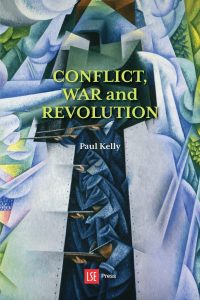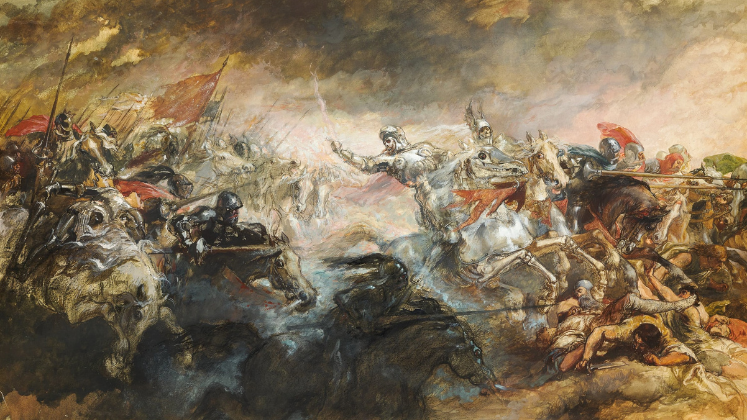E-book Evaluate: Battle, Battle, and Revolution: The Downside of Politics in Worldwide Political Thought by Paul Kelly
In Battle, Battle, and Revolution: The Downside of Politics in Worldwide Political Althought – available open access from LSE Press – Paul Kelly presents a wealthy and interesting introduction to worldwide political thought via ten key historic thinkers. Readers coming to political principle for the primary time will discover Kelly’s evident enthusiasm for these concepts deeply infectious and this ebook an thrilling entrance to the sphere, recommends Christopher Finlay.
Battle, Battle, and Revolution: The Downside of Politics in Worldwide Political Thought. Paul Kelly. LSE Press. 2022.
 In Battle, Battle, and Revolution, Paul Kelly presents college students a wealthy and interesting introduction to worldwide political thought via a sequence of ten key historic thinkers. The ebook is free to download from LSE Press, although it is usually doable to purchase a tough copy. College students can both learn it in its entirety as a common introduction to the sphere or they will pull out particular person chapters on the thinkers that curiosity them — every is designed to be accessible by itself phrases.
In Battle, Battle, and Revolution, Paul Kelly presents college students a wealthy and interesting introduction to worldwide political thought via a sequence of ten key historic thinkers. The ebook is free to download from LSE Press, although it is usually doable to purchase a tough copy. College students can both learn it in its entirety as a common introduction to the sphere or they will pull out particular person chapters on the thinkers that curiosity them — every is designed to be accessible by itself phrases.
It’s price drawing consideration to a few fascinating options of the ebook’s total design. First, it’s located in a particular subdiscipline that Kelly identifies as ‘worldwide political principle’ (IPT). Kelly rigorously contrasts IPT with varied issues that both sit on its borders or overlap with it. IPT isn’t the identical, for example, as Worldwide Relations (or Worldwide Relations Principle), although it shares some considerations. Relatively, IPT has emerged as an mental rival to positivist approaches to worldwide politics that are inclined to push normative and prescriptive inquiries to the scholarly sidelines. In opposition to positivists, Kelly argues for the worth of theoretical views that give normative points rather more house.
On the opposite aspect, nevertheless, Kelly distinguishes IPT from the historical past of political thought. He advocates participating with historic thinkers in a manner that’s knowledgeable by historic scholarship. However he resists the tendency of contextualists to argue that previous thought can solely actually be understood by itself phrases. Kelly is satisfied that readers within the current can extract useful insights from historic thinkers and shouldn’t regard them as understandable solely via the methodological lens of historical past. Battle, Battle, and Revolution due to this fact presents an concept of worldwide political principle and political thought that’s knowledgeable, however not trapped, by historical past.
The second notable characteristic of the ebook is the way in which it carves out a a lot wider disciplinary house than the one implicit in what Kelly calls ‘unchallenged however apolitical cosmopolitanism’. Whereas sympathetic to liberalism, he argues for the worth of ‘realism’ in engagement with real-world issues and circumstances, and he situates the ebook within the latest ‘realist flip’ in distancing political principle from what followers of Bernard Williams name ‘moralism’. Kelly thinks that cosmopolitan approaches have ‘marginalized among the most basic challenges going through up to date politics’. His ebook is obtainable as an exploration of a wider array of concepts that he thinks are open to ‘alternative ways of doing politics, exercising energy, drive, and violence, and conceiving the targets of political exercise and its basic goal’ (5).
Kelly’s emphasis on realism explains among the decisions for chapter subjects. He contains Thucydides, Augustine, Machiavelli, Thomas Hobbes and Carl Schmitt, all of whom are ceaselessly taken to lean in a realist route. As well as, he additionally contains chapters on John Locke, who represents one thing of a liberal view, and Jean-Jacques Rousseau, representing an inward transfer in opposition to Enlightenment cosmopolitanism in direction of nationalist id and sovereignty. Lenin and Mao, who seem in a single chapter, are chosen on the premise that it was via them that Marxism ‘had the best affect on worldwide thought and affairs’ (305). Maybe essentially the most novel alternative for a chapter in a ebook on political thought is Clausewitz. Kelly argues that the writer of On Battle shouldn’t be bracketed as a theorist of curiosity to navy specialists solely and that he presents an essential view on worldwide politics extra broadly.

Picture by Birmingham Museums Trust on Unsplash
Whereas the chapters are supposed to be readable by college students as self-standing items and Kelly explicitly disavows any try to unify the readings in a related historic narrative, he means that three ‘linking points’ body the ebook as an entire: ‘violence and politics, temporality and alter, and the which means and significance of historical past’ (25). Particularly, the figures Kelly chooses all ‘take as basic the position of violence, battle, and coercion’. For these thinkers, violence is seen as an ineradicable drawback in political expertise but additionally as a key instrument within the pursuit of political targets or as a key type of political company (5).
As Kelly acknowledges, cosmopolitans and liberals too have grappled with questions in regards to the utility of violence and the legitimacy of utilizing it for varied functions. We’ve got overtly cosmopolitan and liberal accounts of simply wars of nationwide defence, navy intervention and armed resistance, for example, to not point out accounts of focused killing and different practices of political violence. This being the case, it could be argued that cosmopolitan principle is sort of satisfactory for participating with supposedly realist themes.
Then again, the historic thinkers launched in Battle, Battle and Revolution mix normative considering with empirical principle in ways in which a lot much less ceaselessly happen in up to date analytical political philosophy. As an illustration, when Machiavelli and Hobbes supply steerage on moral political motion or simply political establishments, they achieve this on the premise of generalised claims about human nature, assets, human behaviour and historical past. Political principle for them isn’t solely about determining what the morally proper factor to do is, given a alternative; it’s simply as a lot about understanding how the alternatives with which political actors are confronted are formed by attribute empirical components that we have to perceive on the whole phrases.
The third factor that requires remark is gender steadiness. Kelly defends the truth that the historic authors he has chosen as subjects for the chapters are all male. In a nutshell, he takes the ebook’s job to be to current concepts which have been handed down by historic traditions that have been themselves formed by gendered energy relations. Doing so will make them accessible to college students and students who can then criticise them from views formed by feminist thought.
That being stated, I questioned why somebody of the stature of Hannah Arendt wasn’t included. Arendt is definitely some of the perceptive theorists now we have of the ebook’s linking points. The theme of violence types a persistent theme all through Arendt’s work. Her reflections on the unprecedentedness of totalitarianism are set out in distinctive therapies of nineteenth- and twentieth-century historical past at nationwide, regional and worldwide ranges. Likewise, Arendt’s reflections on the relationships between up to date political issues and the historical past of Western political considering converse to the ‘which means and significance of historical past’ at one other degree. Furthermore, Kelly suggests at one level that Arendt was engaged in a largely tacit dialogue with Schmitt, the topic of Chapter Ten, and, certainly, that she was amongst those that contributed to the unfold of his concepts after World Battle Two (373, 400). It could have been good to have Arendt’s aspect of the controversy.
Kelly’s research of those varied thinkers are participating and satisfying to learn, not least as a result of Kelly is himself extremely engaged by questions on how greatest to interpret them. As an illustration, he argues for a view of Machiavelli that leans sharply in direction of the amoralist aspect of debate on the which means of his political principle. Personally, I learn Machiavelli fairly in another way, however I totally loved being stimulated by Kelly’s chapter to assume extra rigorously about why I do. I think many readers coming to political principle for the primary time will discover Kelly’s evident enthusiasm for the concepts deeply infectious and Battle, Battle, and Revolution an thrilling introduction to the sphere.
Please read our comments policy before commenting.
Observe: This text provides the views of the writer, and never the place of USAPP – American Politics and Coverage, nor of the London Faculty of Economics.
Shortened URL for this publish: https://bit.ly/3zUpqWI
Concerning the reviewer
Christopher Finlay – Durham College
Christopher Finlay is Professor of Political Principle at Durham College’s Faculty of Authorities and Worldwide Affairs. He writes on political thought and the ethics of political violence.
Source link
